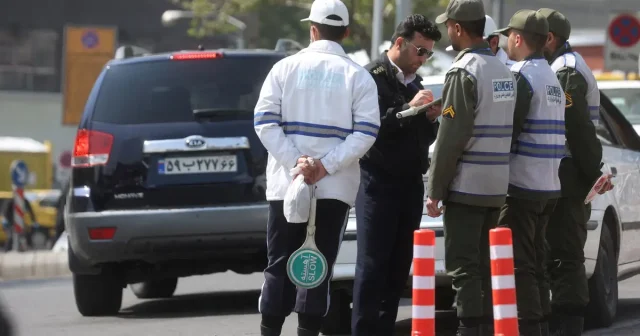The recent hijab crackdown has exposed deep divisions among Iran’s ruling ultra-hardliners, and a potential campaign to position President Ebrahim Raisi as the successor to Supreme Leader Ali Khamenei upon his passing.
The crackdown began on April 13 with the return of the infamous morality patrols to the streets. The extensive violence including sexual harassment against women has since been widely criticized by some hardliners and the media in Iran, including those close to Speaker of the Parliament Mohammad-Bagher Ghalibaf, as well as some religious Iranians who are supportive of enforcement of hijab rules and Khamenei’s positions in general.
On April 19, a tweet from Mehdi Fazaeli, deputy chief of the office overseeing the publication of Khamenei’s speeches and writings, further escalated controversies surrounding hijab enforcement methods—not the hijab principle—signaled Khamenei’s potential displeasure with the excessive and harsh enforcement f hijab.
In his tweet, Fazaeli first quoted Khamenei’s April 2023 famous edict about hijab last year and added in a note that “certain officials have recently been admonished [by the Supreme Leader] for their out of the ordinary actions [in enforcement of hijab].”
Fazaeli came under an avalanche of attacks from the ultra-conservative Paydari Party members and their allies, in media and social media, notably the ultra-hardliner chief editor of Kayhan daily, Hossein Shariatmadari, who is an appointee of the Supreme Leader. They accused Fazaeli of lying and misrepresenting Khamenei’s position with his tweet, and even being an enemy “infiltrator” in his office.
The Paydari Party itself is positioned at the extreme end of the fundamentalist camp in the Islamic Republic and other ultra-hardliners often refer to them as “super-revolutionaries”.
Interestingly, the Revolutionary Guard (IRGC) linked Javan newspaper rose to Fazeli’s defense in an editorial Monday and criticized Shariatmadari for fanning the flames of a perceived “dichotomy” between Khamenei and his office. The editorial suggested that the Supreme Leader’s own authority is being challenged with ulterior motives “not to be discussed now”.
The party has also found allies in what is being referred to in Iranian political circles as the Mashhad Circle, including President Raisi’s influential and notorious father-in-law, Ayatollah Ahmad Alamolhoda, who expresses views very similar to those of Paydari. Alamolhoda, the most prominent figure of the Mashhad Circle, represents Khamenei in Khorasan-e Razavi Province and is the custodian of the shrine of the eighth Shia imam, Imam Reza.
In very veiled terms, the critics of the Paydari and its associates have hinted that the apparent rebellion of the Paydari against Khamenei, or at least his son Masoud and his associates, may be a plot to place Raisi on the leadership throne when Khamenei dies.
“There is a lot of jostling going on behind the scenes and only muffled noises are heard outside these rooms. The Raisi circle have neutralized Speaker Mohammad-Bagher Ghalibaf and will eventually push aside the former nuclear negotiator Saeed Jalili and his circle too,” a political analyst who requested anonymity told Iran International.
The hijab crackdown is spearheaded by the far-right Paydari Party and its allies in the government of President Raisi including the Interior Minister Ahmad Vahidi, Police Chief Ahmadreza Radan, and Meysam Nili-Ahmadabadi, an advisor to the Minister of Islamic Guidance Mohammad-Mehdi Esmaili.
Nili-Ahmadabadi, a member of the Paydari Party and brother to Raisi’s son-in-law Meghdad, is a shadowy figure with much influence in many government and state bodies including the state broadcaster (IRIB) and the Supreme Council of the Cultural Revolution where he heads the Hijab and Chastity taskforce.
Nili-Ahmadabadi is also the managing director of Raja News, the unofficial mouthpiece of Paydari Party and the late Ayatollah Mesbah Yazdi’s followers. He has close ties to security forces and maddahs (religious eulogists) with far-right political leanings.
The “super revolutionaries” were not satisfied even when the X account of Khamenei’s official website, khamenei.ir, retweeted Fazaeli’s tweet to support him. The hardliners continued their criticism even though Khamenei’s social media accounts are overseen by his youngest son, the shadowy Masoud Khamenei. This can be interpreted as a challenge by some hardliners to Khamenei’s own son before an impending scramble for succession.
Fazaeli’s critics, including Shariatmadari, insist that they need to hear the criticism from the “Supreme Leader’s own lips”.
“We emulate Mr Khamenei, not Khamenei.ir,” a tweet in response to Fazaeli said, which is being widely quoted as evidence of defiance by ultra-hardliners and their refusal to acknowledge the authority of Khamenei.ir and its social media accounts.
The Paydari and their allies are also being referred to by other hardliners and conservatives on social media as Khavarij (Kharijites), the first sect of Islam who rebelled against Khamenei’s namesake, the fourth Caliph and the first of Shia Imams, Ali ibn Abi Talib.
“The Khavarij are sharpening their swords and smearing them with poison,” Ghorbanali Salavatian, a former IRGC commander, tweeted. This referred to Ali’s assassination with a poison-coated sword by a member of the sect in 661 AD.
In an editorial for the reformist Etemad newspaper on Monday, prominent commentator Abbas Abdi referred to the complicated ideological and political background of ultra-hardliner groups who he said have an apocalyptic ideology and a cult-like organization.
Abdi contended that the principal characteristic of the most radical group of ultra-hardliners is “power mongering” and that they have been ousting all other ultra-hardliners from centers of power.
Many are also pointing out the similarity of the behavior and stances of the Paydari circle with those of Mahmoud Ahmadinejad, who in 2011 scornfully quit work for eleven days when Khamenei reinstated an interior minister, Heydar Moslehi, who he had fired.
Henceforth Ahmadinejad and his supporters came to be referred to as the “deviant current” in the vernacular of Khamenei loyalists.
“The real question is whether IRGC’s top echelon would only watch the gladiators in the arena now and wait to step in when the day comes or take action,” Abdi added.






















